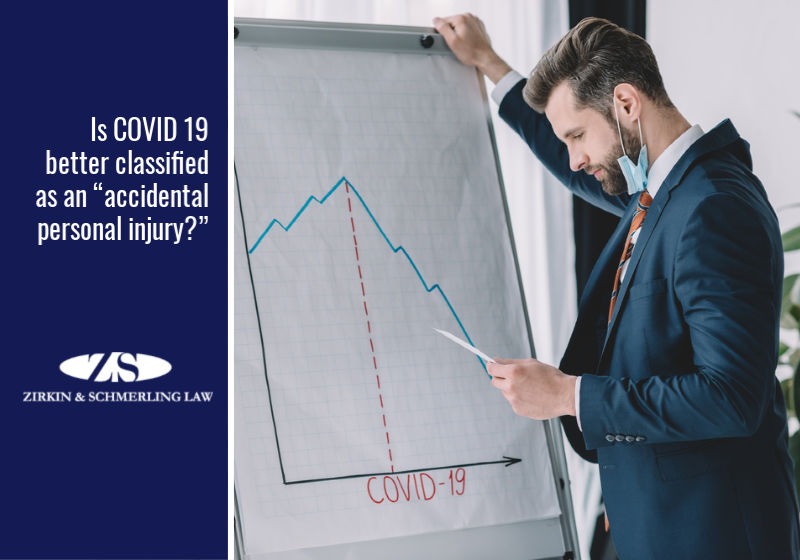
A few weeks ago I wrote a piece discussing whether or not someone who contracts COVID-19 while at work has contracted an “occupational disease” for which he or she could receive workers’ compensation benefits. As I mentioned in that article, COVID-19 presents novel legal questions. In this article, I will consider whether or not COVID-19 is perhaps better-defined as an “accidental personal injury.”
Accidental personal injuries are probably what most people think about when they first think of workers’ compensation. An accidental personal injury is, for the most part, exactly what it sounds like: some injury that a person suffers by chance, while at work. The range of possible accidental personal injuries is endless. Some examples include: straining a muscle while lifting something heavy; suffering a laceration while operating machinery; or breaking a bone by falling from a height. These are some of the typical accidental injuries that arise while people are at work.
The statutory definition of accidental personal injury is found in MD Code Labor and Employment Section 9-101(b):
- Accidental personal injury. — “Accidental personal injury” means:
- (1) an accidental injury that arises out of and in the course of employment;
- (2) an injury caused by a willful or negligent act of a third person directed against a covered employee in the course of the employment of the covered employee; or
- (3) a disease or infection that naturally results from an accidental injury that arises out of and in the course of employment, including:
- (i) an occupational disease; and
- (ii) frostbite or sunstroke caused by a weather condition.
At first glance, one might consider subsection (3), which mentions disease or infection, as possibly encompassing COVID-19. However, the plain language of the subsection goes on to state that only diseases or infections that “naturally result from an accidental injury” are to be classified as accidental personal injuries. In other words, the disease or infection must be secondary to some more typical physical injury. An example might be someone at work who suffers a seemingly minor scratch on their hand. If the scratch becomes infected and causes more serious health issues, those issues would be considered an accidental personal injury pursuant to subsection (3).
Maryland’s highest court, the Court of Appeals, examined the parameters of “accidental personal injury” in the case of Belcher v. T. Rowe Price, 329 Md. 709 (1993). That case involved a woman who was sitting at her desk when a huge construction beam came crashing through the ceiling very close to her. Thankfully, she was not physically harmed, but she suffered significant psychological effects from this frightening and traumatic experience. A full discussion of this case is not on point for this article, because COVID-19 is of course a physical illness, not a psychological one. However, the case is relevant because the Court examined in depth the definition of what constitutes an “accidental personal injury.”
The Court wrote: “…[T]he physical injury need not be caused by physical impact or harm directly to the body but may be the result of a nervous shock. Furthermore, the injury need not be externally apparent, but may be to the internal structure of the body, as for example, cerebral hemorrhage, apoplexy, heart failure or paralysis. The symptoms of injury need not be immediately apparent but may follow the accident by some lapse of time.”
I believe that the Court’s analysis in Belcher provides for the possibility of defining COVID-19 as an accidental personal injury. The physical injuries arising out of COVID-19 are not due to an immediately traumatic experience at the macro level, such as a twisted ankle or broken bone. However, there is some physical interaction that occurs whereby the virus cells interact with and infect the host’s lung cells. This is certainly more than a mere “nervous shock” and should be considered a “physical injury.”
Secondly, the damage caused by COVID-19 is to the “internal structure” of the body, which again is allowable pursuant to the Belcher analysis of accidental personal injuries.
Finally, the symptoms of COVID-19 may not arise immediately, but only after some period of incubation. This factor as well does not appear to be problematic according to the language from Belcher that I quoted above.
All in all, I think there are arguments to be made, based on the statutory definitions and case law, that COVID-19 can constitute an occupational disease, an accidental personal injury, or both. It remains to be seen how the Workers’ Compensation Commission and the courts of Maryland define the disease.
Please feel free to call us at 410-753-4611 if you have any questions about COVID-19 as it pertains to a possible workers’ compensation claim, or any other question related to workers’ compensation in Maryland.
